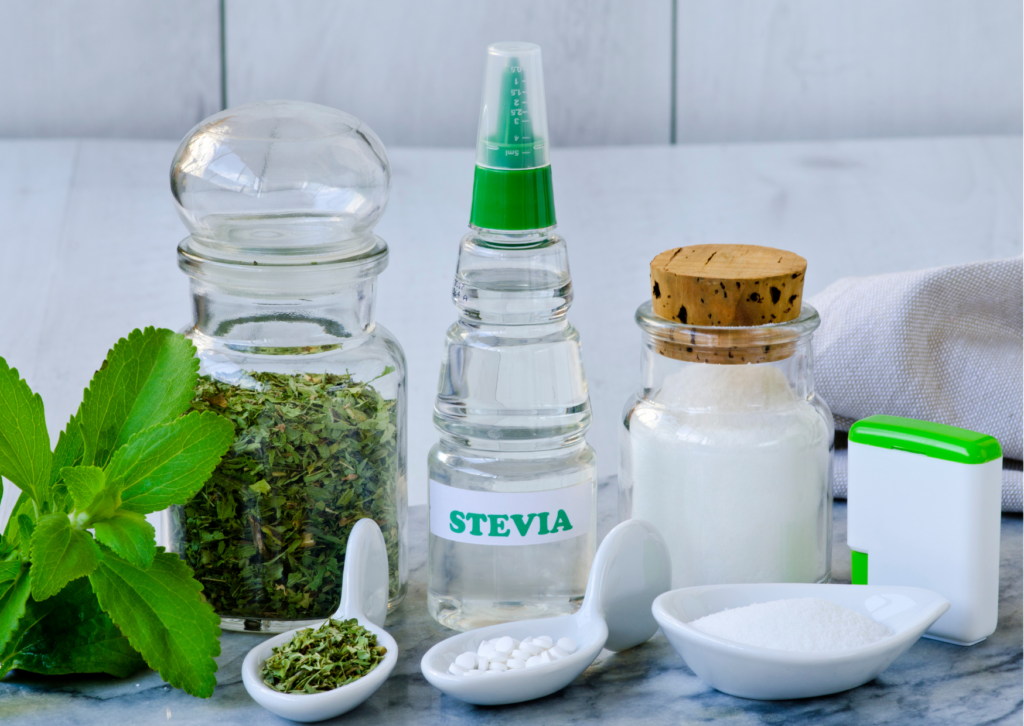Navigating the Sweet Spot: Artificial Sweeteners and Gut Health
Artificial sweeteners, once praised as a boon for diabetics and weight-conscious individuals, now face scrutiny for their potential impact on gut health. Questions arise about whether the benefits of enjoying sweetness without calories outweigh the risks. This blog post explores the safety of various artificial sweeteners and their implications for our gut microbiome.

Understanding Artificial Sweeteners
Artificial sweeteners fall into two main categories: Nutritive and Non-Nutritive Sweeteners.
- Nutritive sweeteners, such as sorbitol, xylitol, and erythritol, offer a lower-calorie alternative to traditional sugars. Dieters and those with diabetes commonly favor these sweeteners because they do not cause a significant spike in blood glucose. Additionally, they are tooth-friendly and do not contribute to cavities.
- Non-nutritive sweeteners like Aspartame, Acesulfame-K, Neotame, and Saccharin, found in coffee shops and grocery aisles, provide sweetness without adding calories. Recent studies suggest potential drawbacks to these sweeteners, as they resemble sugar molecularly, despite their initial classification as safe for people with diabetes.
Effects on the Body:
As the consumption of zero-calorie sodas has risen, concerns about the health impact of artificial sweeteners have emerged. Studies indicate that these sweeteners may elevate blood sugar levels over time and trigger insulin secretion, potentially influencing appetite and food choices.
The high sweetness intensity of artificial sweeteners can dull taste buds, making natural foods, like fruits, seem less sweet. This dual effect may contribute to elevated glucose levels, increased cravings, and a preference for processed foods.
Artificial Sweeteners and Gut Health:
Recent research, including studies from institutions like Harvard, suggests that certain artificial sweeteners, such as saccharine, sucralose, and aspartame, may disrupt the diversity of the gut microbiome and elevate the risk of glucose intolerance. Researchers have linked populations of unfavorable gut bacteria, such as Enterobacteriaceae and Deltaproteobacteria, with various human diseases.
To Consume or Not to Consume
The decision to include artificial sweeteners in your diet depends on several factors:
- Consumption Quantity: Moderation is key, as all mentioned sweeteners appear safe in reasonable amounts.
- Gut Microbiome Health: A healthy and diverse gut microbiome can better handle the presence of artificial sweeteners.
- Dietary Composition: A diet rich in fiber from natural sources enhances the gut’s resilience to artificial sweeteners. Conversely, a diet heavy on processed foods may benefit from cutting out these sweeteners.
Natural Alternatives: Consider “natural” sweeteners like Stevia and Monk Fruit, with Stevia showing potential impacts on gut health only in large quantities. Monk Fruit remains under study, so moderation is advised.
Prioritizing Health: Studies show that nutritive sweeteners like xylitol do not adversely affect the gut microbiome and may function as prebiotics. If prioritizing health, choosing honey, renowned for its prebiotic, anti-inflammatory, antioxidant, and antibacterial properties, can be a prudent decision.
Best Drink Options: For those seeking a gut-friendly alternative to diet sodas, opting for homemade beverages, like honey-sweetened ice tea or freshly squeezed fruit juices, is recommended. Choosing natural or raw honey and avoiding store-bought imitations is crucial.
Moderation Over Absolutes: Occasional diet soda indulgence is fine but prioritize moderation. Recognize that food quality is as crucial as quantity for a healthy gut and overall well-being.

In the ever-changing realm of artificial sweeteners and gut health, it is crucial to emphasize moderation and adopt a mindful approach to dietary choices. Although more research is required for definitive answers, comprehending the potential impacts empowers individuals to make informed decisions. If uncertainty persists or improving gut health is a goal, seeking guidance from professionals, such as the Gut Health Agency, can offer personalized support.
Take our free gut assessment at this link: https://bit.ly/3EsU8Z8
February 20, 2024
Leave a Reply Cancel reply
Podcast
Have you tuned in?
Let's Start Health; a podcast willing to start the awkward, vulnerable, and even hard conversations needed in order to break through stigmas of mental and physical health, as well as educate and inspire those on a journey to healing. Hosted by Chelsea Haines.
Be the first to comment